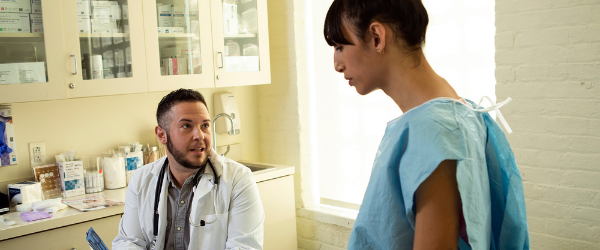
What is a sexually transmitted infection (STI)?
A sexually transmitted infection, or STI (also known as an “STD,” “venereal disease,” or “VD”) is an infection spread from one person to another, usually through vaginal, anal, or oral sex. STIs are caused by bacteria, viruses, or parasites.
Most of the time when people have an STI they don’t have any symptoms at all, but if the infection isn’t treated it can lead to further health problems.
The good news? Getting tested for an STI is really simple, affordable, and most infections can be treated easily by your healthcare provider.
How common are STIs?
The World Health Organization has said there are more than 1 million new STIs acquired across the globe each day.
People between the ages of 15 and 24 acquire half of all new STIs, and 1 in 4 sexually active adolescent females has an STI. But STI rates among the aging population are rapidly increasing too.
Where can I get tested?
Visit any one of MFHC’s Title X (ten) clinics for confidential, affordable STI screenings. No insurance is no problem – we can calculate your visit fee based on the number of people you live with and your income. Find a health center in your area.

-
Chlamydia
Chlamydia can cause serious problems with pregnancies if left untreated. Most people have no symptoms at all, but signs of Chlamydia in people with vaginas could be: abnormal vaginal discharge; burning feeling when peeing; lower back/abdominal pain; pain during sex; fever, nausea, bleeding between periods. Signs in people with penises could be: discharge from penis; burning feeling when peeing; itching/burning around penis opening; swelling of testicles. Chlamydia can be treated with antibiotics prescribed by a physician.
-
Genital Herpes
Genital herpes can be spread by a partner who has it even when you cannot see any blister-like sores. Condoms may not fully protect against this STI. Signs that you have it are burning or itching around genitals or anus, and sores where the virus was spread – such as mouth, penis, or vagina. There is no cure, but pills can reduce the days per year that sores appear and also reduce the risk of spreading it.
-
Gonorrhea
Gonorrhea is spread by touching the penis, vagina, mouth, or anus of an infected person with the infection. Signs in people with vaginas include: pain or burning feeling when peeing; more than usual vaginal discharge; bleeding between periods. Signs in people with penises might include: burning feeling when peeing; white, yellow, or green penis discharge; painful swelling of testicles. Gonorrhea can usually be cured with an antibiotic prescription from your healthcare provider.
-
Syphilis
Syphilis is a bacterial infection. It’s spread by sexual (vaginal, oral, or anal) skin-to-skin contact with a person who has it. It can be cured with medication if treated early.
Hepatitis B – Hepatitis B is a virus that attacks the liver. It can be spread through vaginal, oral, or anal sex, or by contact with blood that has the virus. There are shots to prevent the virus, but there is no cure. -
Hepatitis C
Hepatitis C is a viral infection that causes liver inflammation and damage. The virus can cause both acute and chronic hepatitis, ranging in severity from a mild illness lasting a few weeks to a serious, lifelong illness. It can be spread by using unclean needles, healthcare exposures (although uncommon), sex with an infected person, sharing personal items that have come into contact with infected blood, or being born to a mother who has Hepatitis C. Hepatitis C is treated with antiviral medications, and can cure most people in 8-12 weeks.
-
HIV infection/AIDS
HIV is a virus that causes AIDS – AIDS is the late stage of an HIV infection. HIV is spread by sexual contact with an infected person, or sharing needles or syringes. It can also be spread during pregnancy, childbirth, or breastfeeding. It cannot be spread by touching, hugging, kissing, or sharing food/drink. You can cannot tell by looking if someone has HIV. Using a new condom for every sex act can help prevent the spread of this virus.
There are a few medicines that can help prevent the spread of HIV, as well. For folks who do not have HIV, but who are at higher-than-average risk for getting HIV, PrEP, a once-daily medicine, can be taken to prevent them from getting HIV. Learn more about preventive medicines.
If you think you’ve been recently exposed to HIV, PEP (post-exposure prophylaxis) might be a good option for you. Talk to your healthcare provider to learn more.
-
Human Papillomavirus Virus (HPV)
Human Papillomavirus (HPV) is a virus most sexually active people will get at some point in time. Most of the time, this virus clears from the body on its own in about two years. However, some strains of HPV cause genital warts or may lead to cancer of the genitals, mouth, or throat. There is a shot to prevent some types of HPV, including some types that cause genital warts and cancer.
-
Pelvic Inflammatory Disease (PID)
Pelvic inflammatory disease (PID) is a disease of the uterus that may be caused by an STI that was not treated, but it could also have other causes. Signs of this disease include: abdominal pain; fever; unusual vaginal discharge with a bad odor; painful peeing and/or painful sex; bleeding between periods. PID can be treated by a healthcare provider. If not treated, it can cause damage that may make it impossible to get pregnant.
-
Pubic Lice (Crabs) and Scabies
Pubic lice (crabs) are small bugs that attack the genital area. They itch and can spread between partners during sex. They can be treated with over-the-counter medicine or prescription lotions. Scabies can be treated with prescription medicine. Partners should be treated at the same time for lice or scabies.
-
Trichomoniasis
Trichomoniasis makes the vagina sore and swollen and can be mistaken for a yeast infection. It can have a foamy, greenish, foul-smelling discharge. Tell a healthcare provider about any signs. Don’t try to treat it alone.
Our Impact
Data from January 1, 2024 through December 31, 2024.
-
Total Clients Served
43,926
-
Total Client Visits
65,359
-
Free EC kits distributed
33,289
